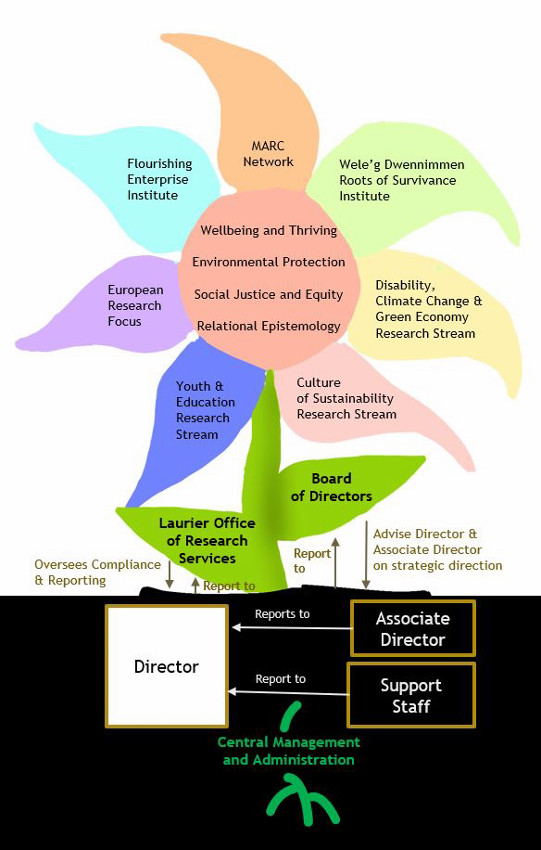We use cookies on this site to enhance your experience.
By selecting “Accept” and continuing to use this website, you consent to the use of cookies.

VERiS’s work is guided by values of environmental protection, wellbeing and thriving for all, and social justice. We are working towards societal conditions aligned with these values through collaborative applied research projects, shifting mindsets through education and knowledge mobilization, influencing policy and regulations, and supporting emerging scholars in their journey to become effective social change agents. Our work is guided by the wisdom of Indigenous knowledge, and we apply an anti-colonial perspective to our work. We work at community, regional, national, and international levels in furthering these objectives.
Affiliated with Wilfrid Laurier University, we are governed by a diverse board of community and university leaders, led by the Centre’s Director Dr. Manuel Riemer and Associate Director Dr. Alexis Buettgen. We operate as an interdisciplinary centre supported with funds by the Office of Research Services, the Faculty of Science, and an endowment provided by the Viessmann family.
There are five research streams operating under the VERiS umbrella:
Each of these streams includes university and community fellows, students, collaborators, and partner organizations. In addition, we host the Municipalities Adapting in Response to Complexity (MARC) network and the Wele’g Dwennimmen Roots of Survivance Institute (Wele’g). The Centre’s operation is supported by our Administrative Manager E. Desmarchelier, Laurier’s Offices of Research Services and Research Finance, and multiple research assistants and associates.

Since its inception in 2000, the Viessmann European Research Centre has devoted itself to fostering and disseminating important research about Europe. Starting in 2016, the centre shifted its orientation toward research and knowledge related to environmental sustainability and community resilience. The Viessmann family provided the original endowment in support of the Viessmann centre. The Viessmann corporation and family have shown significant leadership in addressing climate change and promoting sustainability. Dr. Hans Viessmann, for example, served on the advisory committee for the German Energy Transition plan, working directly with the German chancellor Dr. Angela Merkel. You can learn more about their commitment to become carbon-neutral and their sustainability initiatives at Viessmann.ca.
In 2018, this transition moved into its next phase with a new director, board, name, brand and home to complement the Centre’s new focus. The newly named Viessmann Centre for Engagement and Research in Sustainability (VERiS) maintains its connection to Europe and through our international networks, aims to build upon ground-breaking examples of sustainability in Europe. In 2018, VERiS became part of EvolvGREEN, a new innovation hub for sustainability and the advancement of the ‘Green Economy’ in Canada and beyond.
In January 2019, VERiS and our EvolvGREEN partners moved into the iconic and award winning evolv1 building. evolv1, the development of which was initiated by the environmental NGO Sustainable Waterloo Region, was developed and is owned by the Cora Group (both organizations are VERiS partners). evolv1 is Canada’s first commercial, carbon neutral and net-positive energy, multi-tenant office building and is the result of an elaborate collaboration of multiple partners and significant community support. You can learn more about the unique story of this community-initiated innovative building in this report. This report is one research output among several others that resulted from our longitudinal study in evolv1 on cultures of sustainability.
In the same year, VERiS incubated the Flourishing Enterprise Institute (FEI), which was initiated by FEI Director Randy Sa’d and Director of Research Dr. Peter Jones, together with several other systemically oriented social innovators. The FEI is affiliated with VERiS, although operating independently. In 2020, we began the development of the Municipalities Adapting in Response to Complexity (MARC) network, which is supported by VERiS and co-led with REFOCUS, ICLEI World Secretariat, and the FEI. In October 2023, our research in evolv1 concluded and we moved into the Community Hub on Laurier’s Waterloo campus, where we are co-housed with our close collaborator, the Centre for Community Research, Learning, and Action (CCRLA). In 2024, Dr. Ann Marie Beals established the new Wele’g Dwennimmen Roots of Survivance institute to promote Indigenous ways of being, knowing, and survivance, emphasizing holistic approaches to health and wellbeing. The institute aims to create a space for academic inquiry and community engagement that honours and respects Indigenous knowledge systems, fostering connections among diverse communities while prioritizing Indigenous health and wellbeing. Through collaborative initiatives, Wele’g Roots of Survivance seeks to nurture multifaceted commitments to sustaining Mother Earth, recognizing the importance of promoting the interconnectedness of all living and non-living beings.
VERiS 3 Year Report
Contact Us:
E:
veris@wlu.ca
Office Location: 232 King St North, Waterloo, ON N2G 4V6
Office Hours:
We are currently working remotely.“The deep partnership I have established with VERiS has allowed me to align credible, applied academic research with efforts to test disruptive management innovations in practice. The foundation of trust, integrity and openness that underpins our relationship has made our collaboration highly functional and effective.”